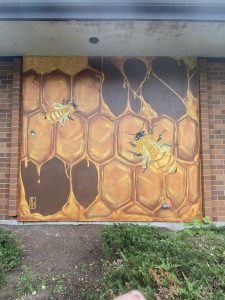Happy World Bee Day!
Bees may have lent a helping wing in bringing you a plate of pizza to your table, whether it is meat or veggie. Bees can help pollinate flowering plants and some species of non-flowering plants, like corn, tomatoes, and eggplants. Corn fed the cattle, which became the meat toppings. The cattle also yielded the milk that became the cheese. The bees help the plants make seeds, which are the offspring.

Bees are just one of many pollinators. Pollinators are insects, birds, and animals that help spread pollen among plants of the same species.
Plant seeds are buried in soil and can sprout to become new plants, restarting the cycle. Pollen and nectar from flowering plants also help bees survive. Bees mix pollen with honey to make food called “bee bread” for their own offspring.
A fun fact about crop cultivation is that farmers have been able to grow self-pollinating strains of tomato plants so that they are more convenient to grow large amounts of them. Not all plants need bees to pollinate. Even so, bees are important for helping maintain the world’s diverse population of wildflowers, fruits, veggies, trees, and pioneer plants.
Tips for helping bees out from United Nations.
How can we do more?
Individually by:
- planting a diverse set of native plants, which flower at different times of the year;
- buying raw honey from local farmers;
- buying products from sustainable agricultural practices;
- avoiding pesticides, fungicides or herbicides in our gardens;
- protecting wild bee colonies when possible;
- sponsoring a hive;
- making a bee water fountain by leaving a water bowl outside;
- helping sustaining forest ecosystems;
- raising awareness around us by sharing this information within our communities and networks; The decline of bees affects us all!
As beekeepers, or farmers by:
- reducing, or changing the usage of pesticides;
- diversifying crops as much as possible, and/or planting attractive crops around the field;
- creating hedgerows.
As governments and decision-makers by:
- strengthening the participation of local communities in decision-making, in particular that of indigenous people, who know and respect ecosystems and biodiversity;
- enforcing strategic measures, including monetary incentives to help change;
- increasing collaboration between national and international organizations, organizations and academic and research networks to monitor and evaluate pollination services.
